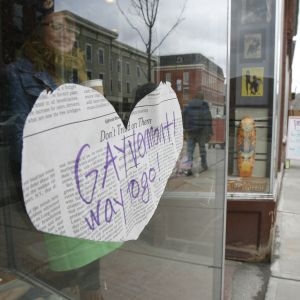 When civil unions were created in Vermont eight years ago, they were the
When civil unions were created in Vermont eight years ago, they were the
result of heated and prolonged debate that started with the question of
how to guarantee equal rights to same-sex couples. Now a new commission
has released a report that studies whether that equality has been
achieved. Tom Little, the chair of the Commission on Family Recognition
and Protection, explains the findings, recommendations and next steps
for the legal status of same-sex couples.
(Listen)
Also in the program, the role of religion in higher education. Pope
Benedict XVI addressed the presidents of U.S. Catholic colleges in
Washington DC last week, and President Jack Neuhauser of Saint Michael’s
College was among them. Jane Lindholm talks with Neuhauser about the
pope’s message to education leaders, and how the principle of academic
integrity intersects with religious instruction.
(Listen)
And if the recent warm weather wasn’t a cue, the calendar will tell you:
it’s time for summer snack shacks and creemee stands to re-open for the
season. We visit with Joe’s Snack Bar in Jericho as the owner prepares
for Thursday’s opening day. (Listen)
Listener comments on same-sex marriage:
Andrew from Rutland:
With regard to people opposed to same sex marriage, my question has always been, "Why the opposition? If you do not like "gay marriage" don’t marry someone of the same sex. How does same sex marriage affect a straight marriage? Let’s focus on issues that really matter in this world; climate issues, health care for all, poverty, food, etc. and let people live their lives with a pursuit of happiness.
Kurth in Springfield:
What happened to the "pursuit of happiness" and the separation of church and state? As a Vermont citizen, I feel it’s everyone right to pursue their ideal, regardless of social stigma. The citizens of Vermont made the choice to accept Civil Unions. The rights of my gay neighbors to live their life as they see fit, is their right, just as it is mine and yours.
Listener named Todd:
Mr. Little is disingenuous when he claims that there is "no tradition" of non-binding referendum votes in Vermont. At the discussion at Vermont Law School last October before the Commission, Law Professor Teachout pointed out that this device had been used 16 times over the course of Vermont’s history, and specfically advocated such a course to discover Vermonter’s inclinations. His comments were not well received by the Commission.
Skeeter from Huntington:
Listening to today’s discussion of same-sex marriage in Vermont, I must remind Rev. Craig Bensen that his longtime call for a statewide referendum on the issue is legally impractical. The Vermont Constitution authorizes statewide referenda only for the purpose of ratifying amendments or revisions to the Constitution itself. Any referenda on same-sex marriage, therefore, can be conducted only at the town level and even then, only on a non-binding, advisory basis.
Moreover, ever since the U.S. Supreme Court fully legalized private, consensual same-sex relationships in 2003 (Lawrence v. Texas), I have argued that the issue of legalizing same-sex marriage should be seen as less of an issue of civil rights for gay and lesbian couples and more of an issue of separation of church and state.
It’s no accident that the fiercest opponents of same-sex marriage repeatedly invoke religious approbations against homosexuality as their justification to bar gay and lesbian couples from marrying legally. They have wrongfully confused the institution of civil marriage with the religious sacrament of holy matrimony. Contrary to popular belief, the two are not the same thing.
Religious institutions have every right under the First Amendment to deny the sacrament of holy matrimony to gay and lesbian couples on religious grounds. But the very same First Amendment bars the state from employing religious objections to deny civil marriage to gay and lesbian couples. The state is further barred from doing so by the Religious Test Clause (Article VI, Section 3) of the Constitution.
It is, therefore, no longer a question of if same-sex marriage will be legal in Vermont and all 49 other states, but when.